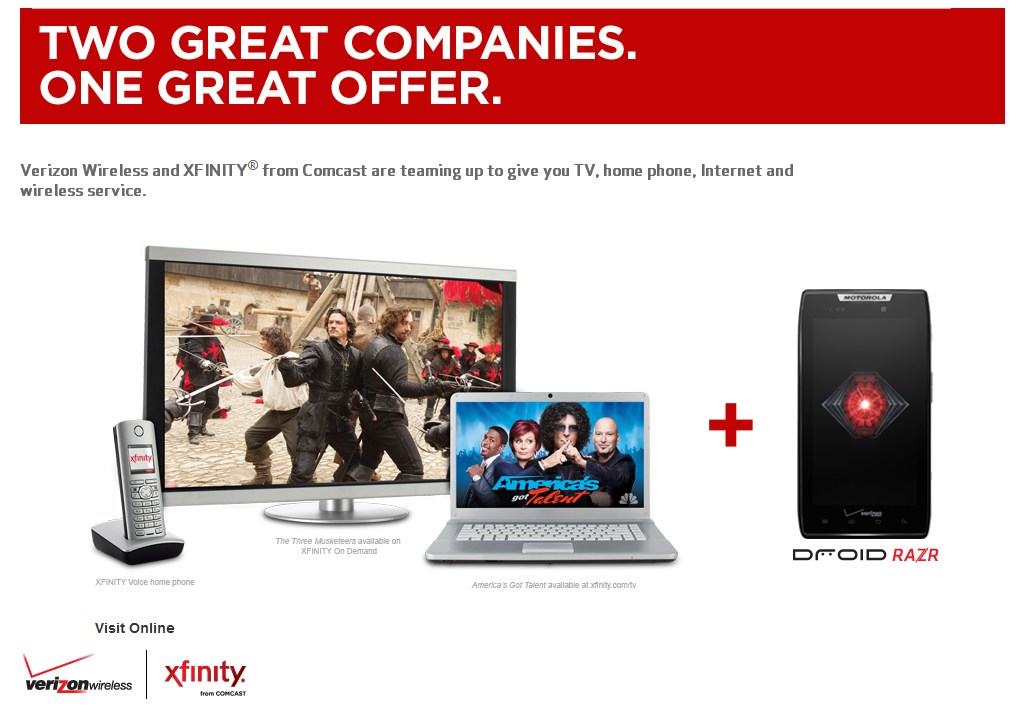The Department of Justice today announced it had achieved a settlement with Verizon and four major cable operators regarding their efforts to establish a cross-marketing agreement to sell each other’s services, sell wireless spectrum, and develop a technology research joint venture.
Despite criticism that the deal represented a strong case for marketplace collusion that would reduce competition between Verizon’s FiOS fiber to the home service and cable company offerings, the Justice Department signed off on a series of deal revisions it defends as protective of competition and consumers. Among them is a time limit for the cross-marketing deal and restrictions on where Verizon Wireless can cross-market cable company services.
“By limiting the scope and duration of the commercial agreements among Verizon and the cable companies while at the same time allowing Verizon and T-Mobile to proceed with their spectrum acquisitions, the department has provided the right remedy for competition and consumers,” said Joseph Wayland, acting assistant Attorney General in charge of the Department of Justice’s Antitrust Division. “ The Antitrust Division’s enforcement action ensures that robust competition between Verizon and the cable companies continues now and in the future as technological change alters the telecommunications landscape.”
The proposed settlement forbids Verizon Wireless from selling cable company products in areas where its FiOS service is available. That is a major reversal from the original agreement between Verizon and Comcast, Time Warner Cable, Cox and Bright House Networks which restricted Verizon Wireless from marketing FiOS. Under the original deal, Verizon Wireless stores could effectively only sell cable company products, never FiOS. The Justice Dept. will still permit Verizon Wireless to sell cable service, but supposedly not at the expense of the fiber service.
The agreement also specifies that Verizon Wireless can sell cable service in areas where it currently markets DSL only until the end of December 2016, renewable at the sole discretion of the Justice Dept. Antitrust lawyers were concerned Verizon would be unlikely to expand its FiOS network or improve DSL service in areas where it could simply resell cable service.
Justice lawyers also put a similar time limit on the technology joint venture, making sure any collaborative efforts don’t impede competition.
 The settlement also approves of Verizon’s proposed acquisition of spectrum from the cable companies and T-Mobile USA’s contingent purchase of a significant portion of that spectrum from Verizon.
The settlement also approves of Verizon’s proposed acquisition of spectrum from the cable companies and T-Mobile USA’s contingent purchase of a significant portion of that spectrum from Verizon.
The deal has been signed off by Justice lawyers, the companies involved, and the New York State Attorney General’s office. FCC chairman Julius Genachowski also weighed in separately with a positive press statement about the agreement.
But consumer advocates remain concerned that the deal does nothing to enhance competition and allows the companies involved to enjoy a new era of competitive detente from a stable and predictable marketplace. Verizon still has little incentive to innovate its DSL service, free to pitch cable service in those areas instead, and without robust changes to the marketplace where FiOS is sold, cable operators have little to fear from Verizon’s stalled FiOS rollout and recent price increases.
Parts of the agreement may also prove confusing to consumers. An important concession prohibits Verizon Wireless from selling any cable service to a street address that is within the FiOS footprint or in any neighborhood store where Verizon FiOS is available. Consumers likely to receive broadly marketed special offers that offer bundled discounts could be frustrated when they are prohibited from signing up because of where they live.
This concession also requires both Verizon and cable operators collaborate to share information about where Verizon FiOS competition exists currently and where it will become available in the future, so that unqualified customers are not sold cable service in violation of the agreement. That represents valuable information for cable operators, who will receive advance notification that customer retention efforts may be needed in areas where Verizon’s fiber optic service is scheduled to become available for the first time.
Any person may submit written comments concerning the proposed settlement during a 60-day comment period to Lawrence M. Frankel, Assistant Chief, Telecommunications & Media Enforcement Section, Antitrust Division, U.S. Department of Justice, 450 Fifth Street, N.W., Suite 7000, Washington, D.C. 20530. At the conclusion of the 60-day comment period, the U.S. District Court for the District of Columbia may enter the proposed settlement upon finding that it is in the public interest.


 Subscribe
Subscribe
